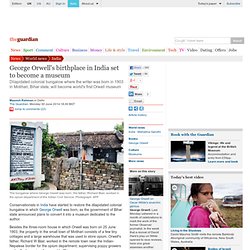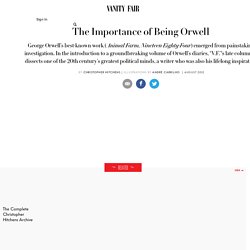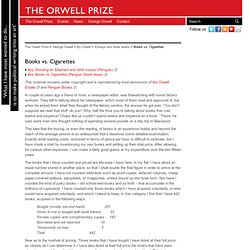

Complete works, Biography, Quotes, Essays. George Orwell, human resources and the English language. In our age there is no such thing as ‘keeping out of human resources’.

All issues are human resource issues, and human resources itself is a mass of lies, evasions, folly, hatred and schizophrenia. OK, that’s not exactly what Orwell wrote. The hair-splitters among you will moan that I’ve taken the word “politics” out of the above and replaced it with “human resources”. Sorry. But I think there’s no denying that had he been alive today, Orwell – the great opponent and satirist of totalitarianism – would have deplored the bureaucratic repression of HR. In particular, Orwell would have utterly despised the language that HR people use. In our time, political speech and writing are largely the defence of the indefensible … Thus political language has to consist largely of euphemism, question-begging and sheer cloudy vagueness. Repeat the politics/human resources switch in the above and the argument remains broadly the same.
Not giving subjects to any of these responses is a deliberate ploy. George Orwell's birthplace in India set to become a museum. The bungalow where George Orwell was born.

His father, Richard Blair, worked in the opium department of the Indian Civil Service. Photograph: AFP Conservationists in India have started to restore the dilapidated colonial bungalow in which George Orwell was born, as the government of Bihar state announced plans to convert it into a museum dedicated to the author. Besides the three-room house in which Orwell was born on 25 June 1903, the property in the small town of Motihari consists of a few tiny cottages and a large warehouse that was used to store opium. Orwell's father, Richard W Blair, worked in the remote town near the Indian-Nepalese border for the opium department, supervising poppy growers and collecting opium for export to China.
6 WRITING TIPS FROM GEORGE ORWELL. There’s a lot you can learn from Orwell’s writing.

His Animal Farm and 1984 are now considered masterpieces – ironic, given the difficulties in getting them published – and are studied in school, I hear. “Intelligence and wit, awareness of social injustice, opposition to totalitarianism, and commitment to democratic socialism” are some of his traits. Some of them are impossible to emulate or even approximate. If you did, your work would be described as Orwellian, which shows how difficult the task would be. He set the bar high, though he would never have said so as you’ll see in point 3. 1. “The writers I care about most and never grow tired of are: Shakespeare, Swift, Fielding, Dickens, Charles Reade, Flaubert and, among modern writers, James Joyce, T. 2.
What am I trying to say? 3. 4. 5. 6. Orwell offers a possible translation of what he considers to be good English to a version that fails to obey these guidelines. Christopher Hitchens on George Orwell’s Political Mind. At various points in his essays—notably in “Why I Write” but also in his popular column “As I Please”—George Orwell gave us an account of what made him tick, as it were, and of what supplied the motive for his work.

At different times he instanced what he called his “power of facing unpleasant facts”; his love for the natural world, “growing things,” and the annual replenishment of the seasons; and his desire to forward the cause of democratic socialism and oppose the menace of Fascism. Other strong impulses include his near-visceral feeling for the English language and his urge to defend it from the constant encroachments of propaganda and euphemism, and his reverence for objective truth, which he feared was being driven out of the world by the deliberate distortion and even obliteration of recent history. The diaries are not by any means a “straight” guide, or a trove of clues and cross-references. From this period also dates some of Orwell’s best and most mordant egalitarianism.
Books vs. Cigarettes. This material remains under copyright and is reproduced by kind permission of the Orwell Estate and Penguin Books.

A couple of years ago a friend of mine, a newspaper editor, was firewatching with some factory workers. They fell to talking about his newspaper, which most of them read and approved of, but when he asked them what they thought of the literary section, the answer he got was: “You don’t suppose we read that stuff, do you? Why, half the time you’re talking about books that cost twelve and sixpence! Chaps like us couldn’t spend twelve and sixpence on a book.”
These, he said, were men who thought nothing of spending several pounds on a day trip to Blackpool. This idea that the buying, or even the reading, of books is an expensive hobby and beyond the reach of the average person is so widespread that it deserves some detailed examination. The books that I have counted and priced are the ones I have here, in my flat. Now as to the method of pricing. . £ | s. | d.